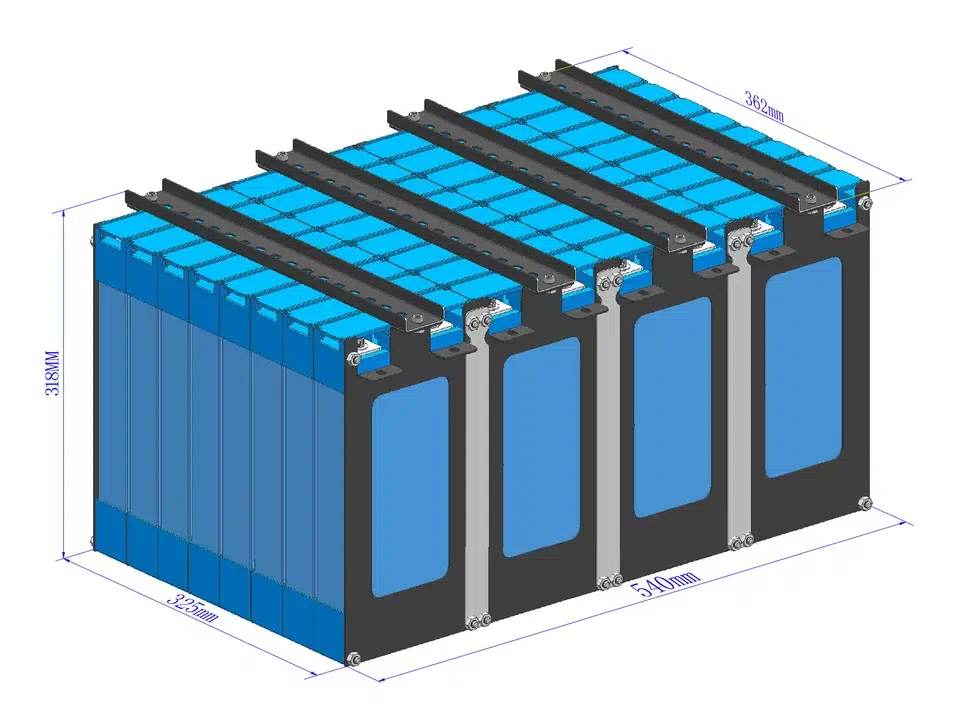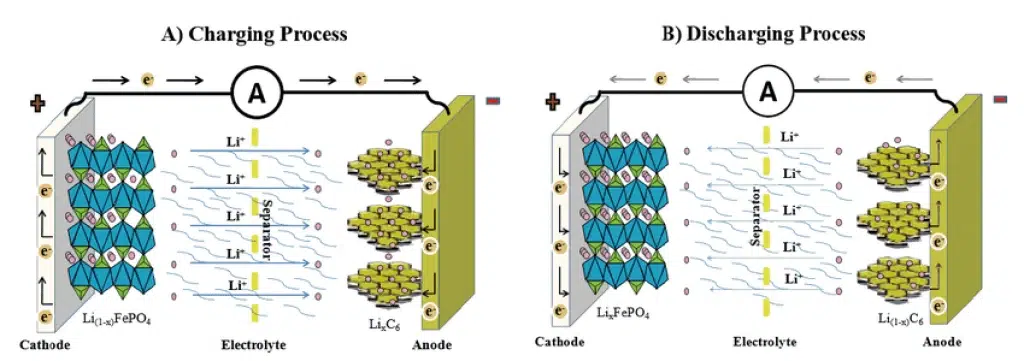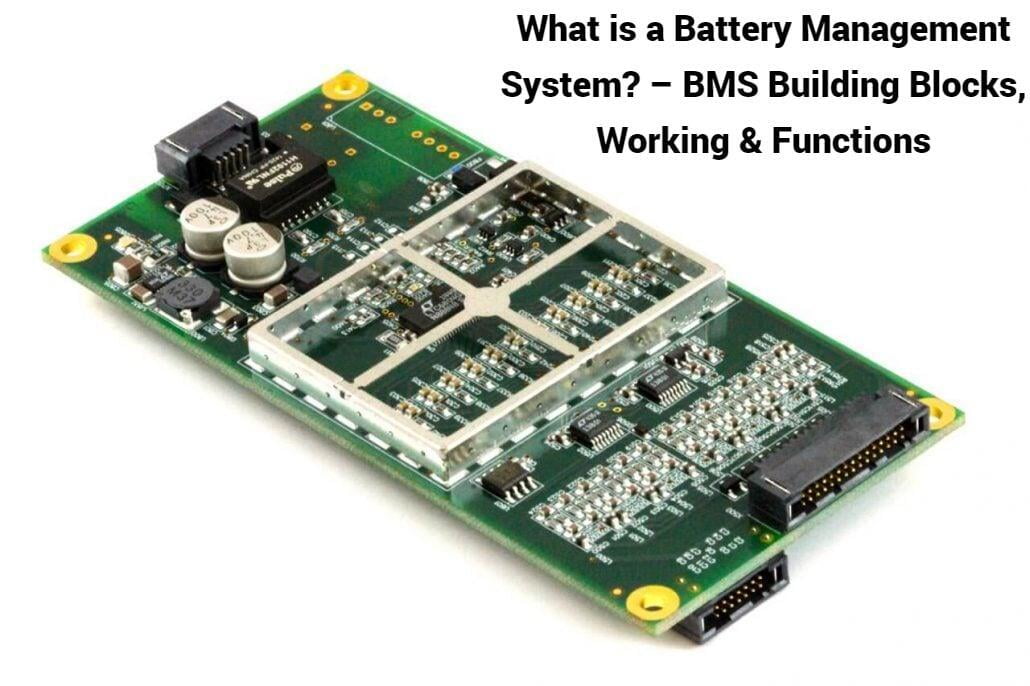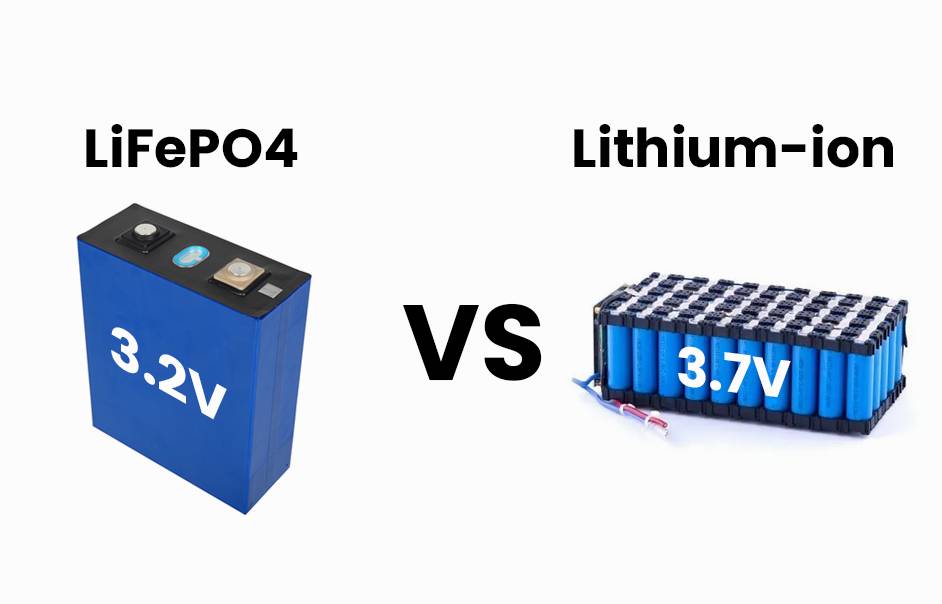In de afgelopen jaren, lithiumijzerfosfaat (LiFePO4) Batterijen zijn steeds populairder geworden als betrouwbare en kosteneffectieve oplossing voor energieopslag. Ze zijn bijzonder geschikt voor gebruik in elektrische voertuigen, hernieuwbare energiesystemen, back-upvoedingen en andere toepassingen met hoog vermogen. Echter, met zoveel verschillende LiFePO4-lithiumbatterijen op de markt, Het kiezen van de juiste keuze voor uw behoeften kan een uitdaging zijn. In dit artikel, we zullen onderzoeken hoe u een LiFePO4-lithiumbatterij van hoge kwaliteit kunt kiezen.

Wat is LiFePO4-lithiumbatterij?
LiFePO4, afkorting van lithiumijzerfosfaat, is een lithium-ionbatterij die lithiumijzerfosfaat gebruikt (LiFePO4) als positieve elektrode en een grafiet-koolstofelektrode met metalen achterkant als negatieve elektrode. Het is oplaadbaar en valt in de bredere categorie lithium-ionbatterijen. LiFePO4 lithiumbatterijen staan bekend om hun hoge energiedichtheid, lange levensduur en uitstekende thermische stabiliteit. In tegenstelling tot andere lithium-ion chemische materialen, LiFePO4-lithiumbatterijen zijn inherent veiliger vanwege hun stabiele chemische structuur en het lagere risico op thermische overstroming.
De voordelen van LiFePO4-lithiumbatterijen
Veiligheid: LiFePO4-lithiumbatterijen worden beschouwd als een van de veiligste chemicaliën voor lithium-ionbatterijen die momenteel beschikbaar zijn. De structuur is stabiel en het risico op thermische runaway is laag. Ze zijn niet gevoelig voor oververhitting of verbranding, de kans op een ongeval of brand is dus zeer klein.
Lange levensduur: Vergeleken met andere lithium-ionbatterijen, LiFePO4-lithiumbatterijen zijn bestand tegen meerdere laad- en ontlaadcycli. Ze hebben doorgaans een levensduur van 2,000 naar 5,000 keer of meer, afhankelijk van het specifieke merk en de gebruiksomstandigheden. Hierdoor kun je deze batterijen jarenlang gebruiken zonder dat je ze regelmatig hoeft te vervangen.
Hoge energiedichtheid: LiFePO4 lithiumbatterijen hebben een hoge energiedichtheid, en ze kunnen een grote hoeveelheid energie opslaan in een relatief klein volume. Dit maakt ze ideaal voor toepassingen waar de ruimte beperkt is, zoals elektrische voertuigen en draagbare apparaten.
Groot bedrijfstemperatuurbereik: Deze batterij werkt goed bij verschillende temperaturen, Of het nu een hete zomer of een koude winter is, heeft geen invloed op hun prestaties. Dit maakt LiFePO4-lithiumbatterijen geschikt voor verschillende klimatologische en omgevingsomstandigheden.
Snel opladen: De LiFePO4 lithiumbatterij laadt zeer snel op, Dit betekent dat u de batterij in een kortere tijd volledig kunt opladen, het verminderen van de wachttijd en uitvaltijd van het apparaat. Dit is vooral handig voor toepassingen die een hoge efficiëntie en een snelle doorlooptijd vereisen.
Nadelen van LiFePO4-lithiumbatterij
Lage energiedichtheid: Hoewel de energiedichtheid van LiFePO4-lithiumbatterijen aanzienlijk is, het is iets lager in vergelijking met sommige andere soorten lithium-ionbatterijen (zoals lithiumkobaltoxidebatterijen, LiCoO2). In eenvoudige bewoordingen, De energiedichtheid geeft aan hoeveel energie een batterij kan opslaan bij dezelfde fysieke grootte. Daarom, De LiFePO4-lithiumbatterij heeft mogelijk een iets lagere capaciteit dan sommige andere batterijtypen van hetzelfde formaat.
Hoge initiële kosten: De initiële kosten van LiFePO4-lithiumbatterijen zijn meestal hoger dan die van andere soorten batterijen. Dat betekent dat u bij aankoop meer moet betalen. Echter, op lange termijn, LiFePO4-lithiumbatterijen hebben een langere levensduur en stabielere prestaties, dus ondanks de grote initiële investering, hun lange levensduur en uitstekende prestaties zorgen ervoor dat het geld vaak goed wordt besteed.
Factoren waarmee u rekening moet houden bij het kopen van een LiFePO4-batterij
Bij het kiezen van de beste LiFePO4-batterij voor uw specifieke behoeften, u moet rekening houden met verschillende sleutelfactoren:
Capaciteit en spanning
Bij het kiezen van een LiFePO4 lithiumbatterij, capaciteit en spanning zijn twee sleutelfactoren. De capaciteit bepaalt hoeveel energie een batterij kan opslaan en wordt meestal gemeten in ampère-uren (Ah) of wattuur (Wh). De specifieke eisen zijn afhankelijk van de energiebehoefte van de apparatuur. Kleine apparaten zoals zaklampen of smartphones hebben mogelijk slechts 500 mAh nodig, terwijl grotere apparaten zoals elektrische auto's of energieopslagsystemen voor thuis honderden tot duizenden Ah aan capaciteit nodig hebben.
Qua spanning, de nominale spanning van LiFePO4-lithiumbatterijen is meestal 3.2 volt per eenheid, het is dus noodzakelijk om ervoor te zorgen dat de accuspanning overeenkomt met de systeemspanning. Als het apparaat een specifieke spanning vereist, zoals een 12 volt motor, Mogelijk moeten meerdere batterijen in serie worden geschakeld om de gewenste spanning te bereiken.
Batterijbeheersysteem (GBS)
Het batterijbeheersysteem (GBS) is een integraal onderdeel van het LiFePO4-lithiumbatterijpakket. Het fungeert als het ‘brein’ van de batterij, het bewaken en beheren van alle aspecten van de werking van de batterij, inclusief ervoor zorgen dat alle onderdelen van de batterij gelijkmatig werken, het regelen van de temperatuur, en voorkomen dat de batterij overladen en ontladen wordt. Bij aankoop van een LiFePO4-lithiumbatterij, Zorg ervoor dat u er een kiest met een betrouwbaar BMS om de batterijprestaties te optimaliseren en de veiligheid te verbeteren.
Levensduur en garantie
De levensduur van de batterij verwijst naar het aantal keren dat een batterij kan worden opgeladen en ontladen voordat de capaciteit aanzienlijk afneemt. Hoogwaardige LiFePO4-lithiumbatterijen hebben doorgaans een levensduur van tussen de 2 en 3 jaar 2,000 En 6,000 cycli. Batterijen met een kortere levensduur moeten vaker worden vervangen, wat veel geld en tijd kan kosten.

LiFePO4-lithiumbatterijen hebben een zeer lange levensduur, maar de specifieke levensduur zal variëren afhankelijk van de kwaliteit van de batterij en de gebruiksomstandigheden. Meestal om 80% ontladingsdiepte, Meer dan 2,000 cycli kunnen worden uitgevoerd, en sommige hoogwaardige batterijen kunnen zelfs reiken 6,000 keer of meer. Controleer de specificaties en garantie-informatie van de fabrikant om een batterij met een bevredigende levensduur te helpen selecteren.
Grootte en gewicht
De fysieke grootte en het gewicht van LiFePO4-lithiumbatterijen zijn cruciale overwegingen, vooral als de ruimte beperkt is of het gewicht beperkt is in uw toepassing. Evalueer de grootte en het gewicht van de batterij om er zeker van te zijn dat deze in de beschikbare ruimte past en geen invloed heeft op de algehele prestaties of draagbaarheid van uw systeem.
Merkreputatie en ondersteuning

Bij het investeren in LiFePO4-lithiumbatterijen, het is van cruciaal belang om een bekend merk te kiezen dat bekend staat om het produceren van hoogwaardige en betrouwbare producten. Onderzoek de reputatie van uw merk, klantenrecensies en after-salesondersteuning om ervoor te zorgen dat u kwaliteitsbatterijen en een uitstekende klantenservice krijgt. Kies merken met een bewezen staat van dienst die doorgaans productgaranties en garanties bieden, evenals klantenondersteuning als er iets misgaat. Doe je onderzoek, lees recensies, en vind betrouwbare merken.
Prijs
Eindelijk, denk aan de prijs van de batterij. De prijs van LiFePO4-lithiumbatterijen varieert afhankelijk van de capaciteit, levensduur en andere kenmerken. Terwijl het verleidelijk is om voor de goedkoopste batterij te kiezen, het is ook belangrijk om rekening te houden met de algehele prijs-kwaliteitverhouding. Hoger geprijsde batterijen kunnen een langere levensduur hebben, snellere oplaadtijden, en betere veiligheidsvoorzieningen, waardoor ze op de lange termijn een kosteneffectievere optie zijn.
De veiligheid van de LiFePO4-batterij is gegarandeerd
Veiligheid is altijd een cruciale overweging bij het gebruik van batterijen, en de LiFePO4-lithiumbatterij is daarop geen uitzondering. Zoek naar batterijen met ingebouwde veiligheidsvoorzieningen, zoals overbelasting, overmatige ontlading, en kortsluitbeveiliging. Deze functies helpen schade aan de batterij of oververhitting te voorkomen, wat gevaarlijk kan zijn.

Hier volgen enkele veelvoorkomende veiligheidsproblemen die verband houden met LiFePO4-lithiumbatterijen:
Overladen: Overladen kan leiden tot gasproductie en, in ernstige gevallen, zwelling of zelfs scheuren van de batterij.
Oververhitting: Lithium-ijzerfosfaatbatterijen genereren warmte wanneer ze worden opgeladen of ontladen, en als deze warmte niet effectief wordt afgevoerd, de batterij zal hierdoor oververhit raken en in brand vliegen.
Kortsluiting: Als de positieve en negatieve elektroden van de batterij slecht contact maken, of de batterij is lek of beschadigd, er kan kortsluiting ontstaan.
Mechanische schade: Fysieke schade aan de batterij, zoals knijpen of prikken, kan een interne kortsluiting veroorzaken, die oververhitting kunnen veroorzaken en, In extreme gevallen, brand of explosie.
Om deze veiligheidsproblemen weg te nemen, De door de fabrikant aanbevolen laad- en ontlaadprocedures moeten worden gevolgd om te voorkomen dat de batterij wordt blootgesteld aan extreme temperaturen of fysieke schade wordt veroorzaakt. In aanvulling, het gebruik van hoogwaardige laders en batterijbeheersystemen kan helpen de prestaties van de batterij te monitoren en overladen of oververhitting te voorkomen.
Heeft u een batterijbeheersysteem nodig? (GBS) in LiFePO4 ?
Ja, het is erg belangrijk om LiFePO4-lithiumbatterijen met een batterijbeheersysteem te kopen (GBS). BMS zorgt voor optimale batterijprestaties, veiligheid en levensduur. U heeft een GBS nodig om de volgende redenen:
Batterij-equalizer
Het LiFePO4 lithiumbatterijpakket bestaat uit meerdere cellen. Na verloop van tijd, De prestaties van de batterij kunnen veranderen, resulterend in ongelijkmatige laadniveaus. BMS bewaakt en balanceert actief het opladen van alle accu's om onbalans te voorkomen, verbeter de algehele prestaties en verleng de levensduur van de batterij.
Bescherming tegen overbelasting en overontlading
Het BMS bewaakt voortdurend de accuspanning om overladen of overmatig ontladen te voorkomen, ervoor te zorgen dat de spanning zich binnen een veilig bereik bevindt, waardoor de prestaties en veiligheid van de batterij worden beschermd. Als de spanning een gevaarlijk niveau nadert, het BMS zal ingrijpen om het laadproces te stoppen of de stroom af te sluiten om overladen te voorkomen. Op dezelfde manier, BMS voorkomt dat de batterij ontlaadt tot boven een veilig niveau, waardoor de batterij wordt beschermd tegen schade.

Foutdetectie en bescherming
Het BMS beschikt over geavanceerde bewakingsmogelijkheden om fouten of afwijkingen in het accupakket te detecteren. Het kan kortsluitingen identificeren, overstromen, of spanningsonevenwichtigheden. Wanneer er een fout wordt gedetecteerd, BMS onderneemt onmiddellijk actie, zoals het isoleren van de defecte accu of het uitschakelen van het gehele accupakket, om verdere schade of veiligheidsrisico's te voorkomen.
Temperatuurregeling
Temperatuur is een sleutelfactor die de prestaties en veiligheid van LiFePO4-lithiumbatterijen beïnvloedt. Extreme temperaturen (of het nu te hoog of te laag is) kan de batterijcapaciteit verminderen en de levensduur ervan verkorten. Het BMS bewaakt de accutemperatuur en, indien nodig, activeert het koel- of verwarmingsmechanisme om het optimale temperatuurbereik te behouden, zorgen voor batterijprestaties en een langere levensduur.
Staat van lading (SOC) Monitoring
Het kennen van de oplaadstatus van een LiFePO4-lithiumbatterij is van cruciaal belang voor het nauwkeurig inschatten van de resterende capaciteit en het plannen van uw energieverbruik. Het BMS meet continu de SOC van de accu en levert realtime gegevens om het gebruik van de accu te optimaliseren en overmatige ontlading of lage lading te voorkomen.
Hoe de LiFePO4-batterijcapaciteit te berekenen?

Het berekenen van de LiFePO4-batterijcapaciteit is eenvoudig. De batterijcapaciteit wordt meestal uitgedrukt in ampère-uren (Ah), die aangeeft hoeveel stroom een batterij in een bepaalde tijd kan leveren. Hier zijn de stappen:
1. Bepaal het gemiddelde stroomverbruik: Ontdek de gemiddelde stroom die uw apparaat verbruikt tijdens gebruik (in versterkers, EEN).
2. Schat de looptijd: Schat in hoe lang u wilt dat de batterij het apparaat van stroom voorziet (binnen uren, uur).
3. Bereken capaciteit: Vermenigvuldig het gemiddelde stroomverbruik met de looptijd om de batterijcapaciteit te verkrijgen (eenheid: ampère-uur, Ah).
Bijvoorbeeld:
Het gemiddelde stroomverbruik van uw apparaat is 5A.
U wilt dat de batterij uw apparaat van stroom voorziet 10 uur.
Dan, de batterijcapaciteit wordt als volgt berekend:
Capaciteit (Ah) = Gemiddelde stroom (EEN) x looptijd (uur)
Capaciteit (Ah) = 5Ax 10 uur
Capaciteit (Ah) = 50 Ah
Houd er rekening mee dat deze berekening alleen schattingen geeft en geen rekening houdt met factoren zoals celefficiëntie, spanningsschommelingen, of veiligheidsmarges. Om de beste prestaties en levensduur van de batterij te garanderen, het wordt aanbevolen om een batterij te kiezen met een capaciteit die iets hoger is dan de berekende waarde.
LiFePO4 met lithium-ionbatterij

LiFePO4-batterijen en andere lithium-ionbatterijen zijn populaire keuzes voor een verscheidenheid aan toepassingen. Echter, Er zijn enkele belangrijke verschillen tussen de twee chemicaliën:
Beveiliging
LiFePO4-lithiumbatterijen zijn veiliger dan andere lithium-ionbatterijen. Hun chemische structuur is stabieler en er is een lager risico op ongelukken of brand. Sommige lithium-ionbatterijen, zoals lithiumkobaltaat (LiCoO2), hebben een hoger risico op thermische runaway en vereisen meer veiligheidsmaatregelen.
Cyclus leven
LiFePO4-lithiumbatterijen hebben een aanzienlijk langere levensduur dan andere lithium-ionbatterijen. Het kan meer dan uitvoeren 2,000 naar 5,000 laad- en ontlaadcycli, en de capaciteit blijft goed behouden. In tegenstelling tot, andere lithium-ionbatterijen hebben een kortere levensduur, LiFePO4-batterijen zijn dus geschikt voor toepassingen die duurzaamheid op de lange termijn vereisen.
Energiedichtheid
LiFePO4 lithiumbatterijen hebben een hogere energiedichtheid, maar niet zo hoog als sommige lithium-ionbatterijen, zoals lithiumkobaltaat (LiCoO2) of lithiummanganaat (LiMn2O4), waarmee meer energie in een kleiner volume kan worden opgeslagen, maar zijn minder veilig.
Kosten
De initiële kosten van LiFePO4-lithiumbatterijen zijn hoger, Maar, op lange termijn, hun langere levensduur en superieure prestaties maken de initiële investering de moeite waard. In tegenstelling tot, andere lithium-ionbatterijen, hoewel de kosten vooraf laag zijn, moeten vaker worden vervangen en hebben hogere langetermijnkosten.
Impact op het milieu
LiFePO4-lithiumbatterijen zijn milieuvriendelijker en bevatten niet-giftige materialen met minder risico op gevaarlijke chemische reacties. Ze kunnen worden gerecycled en hergebruikt om hun impact op het milieu te verminderen. In tegenstelling tot, andere lithium-ionbatterijen kunnen een grotere impact hebben op het milieu.
Waar kan ik LiFePO4-lithiumbatterij kopen?
GycxSolar is de beste plaats om lithium-ijzerfosfaatbatterijen te kopen. Deze batterijen presteren beter dan de meeste batterijen op de markt. Ze hebben functies zoals BMS, Bluetooth, ingebouwde verwarming en garantie. In aanvulling, u krijgt de merknaam van 's werelds toonaangevende leverancier van LiFePO4-lithiumbatterijen.
Conclusie
Met bovenstaande gegevens, u kunt gemakkelijker de beste batterij kiezen en onderscheid maken tussen LiFePO4 en andere lithium-ionbatterijen. Een goede batterij kan een apparaat tien jaar lang laten werken, maar het kiezen van de verkeerde kan tot gevaar leiden, defect raakt en de fabrikant achtervolgt voor vervanging. Als u dus de tijd neemt om uw batterij zorgvuldig te kiezen, kunt u later veel problemen besparen.
Algemeen, LiFePO4-lithiumbatterijen zijn een waardevolle investering. Bij GycxSolar, wij begrijpen dat de kern van elk zonnesysteem de kwaliteit van de zonnecel is. Daarom streven wij ernaar hoogwaardige zonnecellen te produceren die een superieur vermogen en duurzaamheid leveren.
FAQ
Zijn alle LiFePO4-lithiumbatterijen hetzelfde??
Nee, alle LiFePO4-batterijen zijn niet hetzelfde. Batterijen geproduceerd door verschillende fabrikanten kunnen in kwaliteit variëren. Deze batterijen zijn er ook in verschillende typen, maten, capaciteiten, spanningswaarden en functies, dus u moet bij het kiezen op deze factoren letten.
Kan ik LiFePO4 gebruiken zonder GBS??
Hoewel het technisch mogelijk is om LiFePO4-lithiumbatterijen te gebruiken zonder batterijbeheersysteem (GBS), deskundigen raden dit ten zeerste af. BMS is belangrijk voor het monitoren en beschermen van batterijen, het voorkomen van problemen zoals overladen, overdischarging, en oververhitting.
Hoe weet u of de LiFePO4-lithiumbatterij kapot is??
Als u merkt dat de capaciteit van de lithium-ijzerfosfaat-batterij kleiner wordt, de interne weerstand neemt toe, de spanning is onstabiel, of er is fysieke schade, Dit kunnen tekenen zijn van batterijproblemen. In dit geval, het wordt aanbevolen om onmiddellijk te stoppen met het gebruik van de batterij en een professional te zoeken om dit te laten controleren.
Moet ik mijn LiFePO4-lithiumbatterij opladen? 100% Elke dag?
Ja. Experts raden aan regelmatig LiFePO4-lithiumbatterijen op te laden 100% capaciteit. Het wordt niet beïnvloed door het “geheugeneffect” van oudere batterijtechnologie. Daarom, Door hem regelmatig op te laden tot zijn totale capaciteit, blijven de algehele prestaties behouden en wordt een optimale batterijstatus gegarandeerd.
